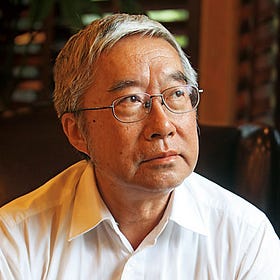Top economists call for fairer income distribution, stronger support for lower-income groups
"Boosting rural residents' pensions now can improve their expectations for future income, encouraging higher current spending and further supporting economic growth."
"Stabilizing expectations" is once again the buzzword among Chinese leadership. Premier Li Qiang chaired a State Council study session the other day dedicated precisely to this topic. Fred Gao has offered details in his newsletter Inside China.
Since the 2023 Central Economic Work Conference, "stabilizing expectations" has replaced “stabilizing prices" in the official language:
Before: stabilizing growth, employment, and prices
After: stabilizing expectations, growth, and employment
Your host has always found the concept of "stabilizing expectations" interesting. The term is somewhat vague, more of a strategic "slogan" than a clearly defined policy measure. Premier Li also recognizes the inherent subjectivity in expectation management:
Economic development is primarily determined by objective conditions, but also has strong subjective elements…Macroeconomic governance must focus not only on balancing supply and demand, but also on managing and guiding expectations to improve regulatory effectiveness
In other words, stabilizing expectations demands concrete macroeconomic interventions. So, what's there in the toolbox?
Many scholars advocate greater government investment—simply put, making the pie larger. Your host has covered this piece last week in case you are interested:
Former advisor to China's central bank calls for more govt investment
China released its Q1 foreign trade figures yesterday, with exports rising by 6.9% (a 13.5% increase in March alone) and imports falling by 6%. Many media outlets have described the export surge in March as a final push before the full impact of Trump's tariffs sets in.
Others emphasize improving the distribution system—in essence, dividing the pie more fairly.
Today's newsletter features several top Chinese economists‘s recent opinions on the issue of distribution. Please note they have not reviewed the following translation, and all the words in bold are added by me.
I. Lu Ting (陆挺), Chief China Economist at Nomura
On April 17, at a media briefing, Lu Ting said:
Given the current economic situation, no policy can boost consumption as effectively as improving social security. In 2025, the minimum standard for rural residents' basic pensions rises by 20 yuan per month, but I believe we can and should increase this further.
Currently, the average monthly pension for rural residents is only around 200 yuan, mostly going to lower-income groups. Even modest increases of 100 or 200 yuan represent substantial growth in their income, significantly raising their willingness to spend. If we could swiftly increase the average monthly pension for rural residents to over 400 yuan, the positive impact on consumption would be remarkable.
Clearly, providing an extra 100 yuan to someone earning 200 yuan per month stimulates consumption far more effectively than giving it to someone earning 10,000 yuan per month.
Moreover, most recipients of rural residents' pensions are the elderly parents of rural migrant workers. Raising pension levels would help relieve some financial pressure on these workers. Additionally, many rural migrant workers themselves will rely on rural residents' pensions upon retirement. Boosting these pensions now can improve their expectations for future income, encouraging higher current spending and further supporting economic growth.
a more practical way to "stabilize expectation", no?
II. Peng Wensheng (彭文生), Chief Economist and Head of Research at the China International Capital Corporation Limited (CICC)
In an interview with LatePost on April 13, Peng Wensheng emphasized that the key issue today is boosting people's incomes, especially addressing income inequality.
Shifting from exports to domestic sales only works if people can afford to spend. To make that happen, raising household incomes is essential.
We should reform our institutions to ensure the benefits of economic growth are shared more evenly. A fairer income distribution means a larger domestic market and stronger global influence. Currently, China is viewed mainly as a competitive producer with low costs. But if we distribute income more fairly, our internal market would expand dramatically, making us even stronger than the U.S., as we'd have robust supply and demand.
Weak consumption has many causes, but fundamentally it comes down to two issues: structural problems, which are deeply rooted, and cyclical factors, related to economic downturns.
On structural issues, I agree with Marx's viewpoint that excessive production stems largely from unequal income distribution—the wealth gap is the main culprit.
Peng further proposed shifting the social security contributions from regressive taxing system to a progressive one to further rebalance income distribution.
Right now, social security contributions total about 24% for individuals and companies combined, capped at three times the local average wage. That means low earners who make just a few thousand yuan per month effectively pay the full 24%, while high earners pay a much smaller percentage, making the taxing system regressive.
An ideal approach is a progressive system: higher earners pay a higher rate. Imagine if social security contributions were reduced by 10 percentage points—someone earning 5,000 yuan per month would immediately see their disposable income rise by 500 yuan.
III. Xu Xianchun (许宪春), Research Fellow at the National School of Development at Peking University
At an online seminar hosted by the China Macroeconomy Forum on April 9th, Xu Xianchun presented research on China's income distribution challenges. He examined three main areas: initial income distribution, income redistribution, and redistribution through public services. His findings highlight several structural issues:
First, households receive too small a share of national income, limiting their spending power. Second, the government's reliance on income and property taxes is relatively low, and social welfare expenditures remain insufficient, weakening the effectiveness of income redistribution in reducing inequalities and boosting consumption. Lastly, public services provided by the government, like healthcare and education, are still too limited, restricting consumer potential and spending growth.
He further proposed five recommendations to address these issues:
Firstly, increase the share of workers' wages within national income. To encourage businesses to raise wages, the government could offer targeted tax incentives or subsidies to companies increasing employee compensation.
Secondly, broaden households' access to property-based income. Developing more robust and diversified capital markets would encourage people to increase earnings through investments, stocks, and bonds.
Thirdly, reform the tax system by reducing taxes on production and increasing taxes on personal income. This shift would enhance the redistributive effect of taxation and address current imbalances.
Fourthly, expand sources of social security funding. Strengthening these funds would allow the government to offer better income protection for lower- and middle-income families.
Finally, scale up government spending on public services. Increasing investment in healthcare, education, and cultural services, with a special focus on regional balance, would significantly enhance overall well-being, release consumer potential, and stimulate domestic spending.






I support redistribution policies, in part because the benefits of reform tend to be unequally distributed with some households even becoming worse off as a result. So redistribution is essential if we want to implement reforms to make the economy more productive.
Mr. Wensheng's suggestion seems an obvious and mandatory question to address, in my humble opinion, while these last 5 suggestions also raise a strong sense of support from me, though I am confused as to how to implement the first one - seeing wage levels as hardly separated from natural laws of supply and demand.
Wish Zhongguó successful domestic reform so that it may achieve great results in reforming the international political system.